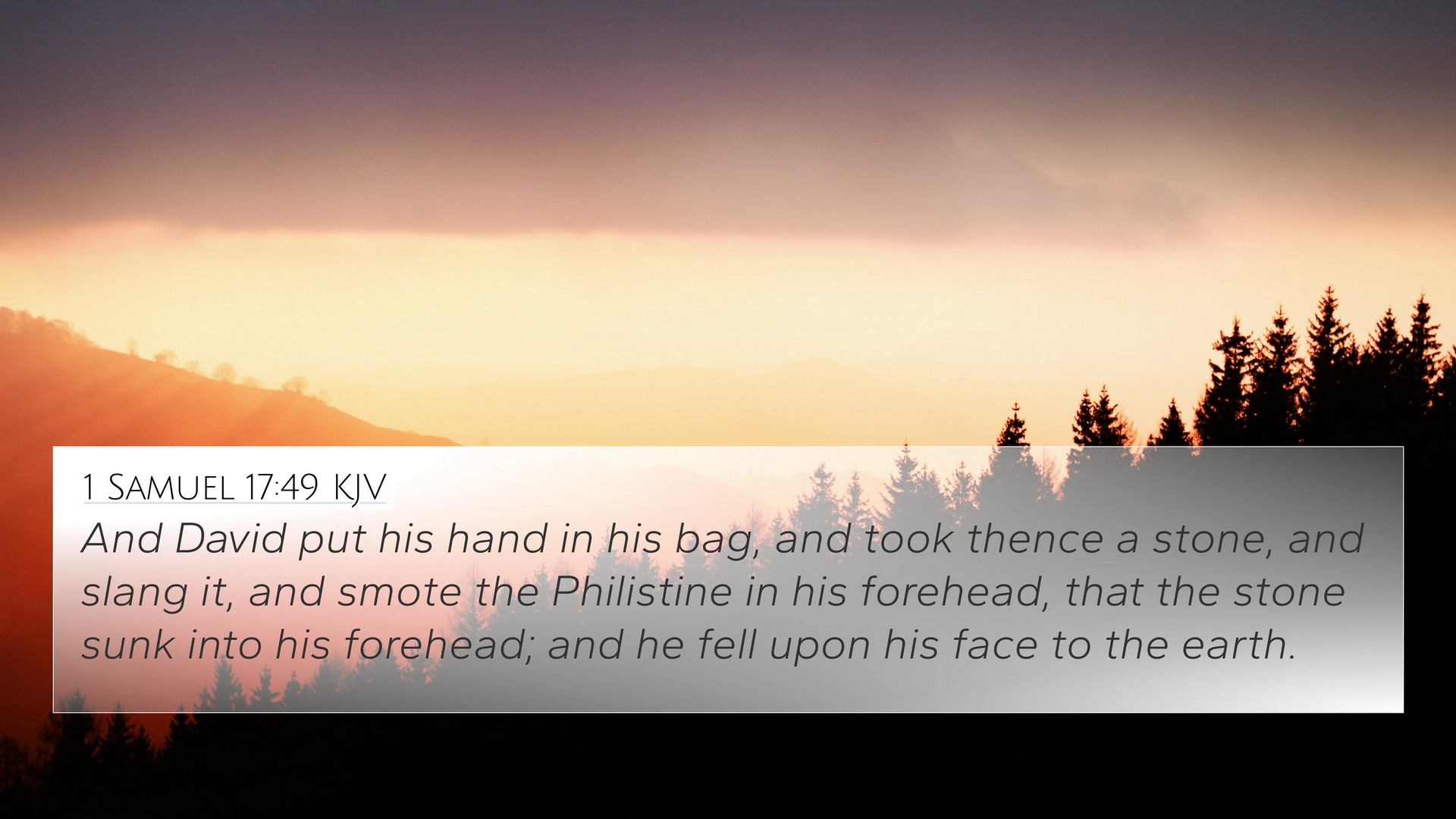Understanding 1 Samuel 17:49
1 Samuel 17:49 recounts the moment when David confronts Goliath, a giant warrior of the Philistines. With unwavering faith and utilizing only a sling and a stone, David strikes Goliath on the forehead, leading to his downfall. This verse intricately ties into themes of faith, courage, and divine intervention, illustrating how God empowers the seemingly weak to accomplish great deeds.
Commentary Insights
According to Matthew Henry, this verse signifies David’s trust in God that enabled him to defeat Goliath with an unlikely weaponry—a mere sling and a stone. Henry emphasizes that this act foreshadows the victories God grants to His faithful servants and showcases God's power transcending human limitations.
Albert Barnes offers a similar perspective, noting that the victory was not merely David's prowess but rather God's intervention. Barnes points out that David's actions demonstrate faith in God's promises, serving as a lesson for believers about reliance on divine strength over human might.
Adam Clarke further emphasizes the historical and cultural context of this battle. He explains that David’s choice of weapon was a strategic one, reflecting his skill as a shepherd. Clarke suggests that this approach symbolizes how God equips individuals for warfare in ways that align with their abilities and circumstances.
Thematic Connections
This verse can be linked to several significant themes and other Bible verses:
- Faith in God: Philippians 4:13 ("I can do all things through Christ who strengthens me") portrays the message of reliance on divine strength.
- Divine Victory: Deuteronomy 20:4 ("For the LORD your God is He who goes with you, to fight for you against your enemies") highlights God's promise of support in battles.
- Overcoming Fear: Isaiah 41:10 ("Fear not, for I am with you") reassures believers of God's presence in daunting situations.
- Courageous Leadership: Joshua 1:9 ("Be strong and courageous") echoes David's courageous spirit in facing Goliath.
- God's Choice: 1 Corinthians 1:27 ("But God chose the foolish things of the world to shame the wise") reflects God's tendency to use the humble.
- Spiritual Warfare: Ephesians 6:11 (“Put on the whole armor of God”) expands on the concept of fighting battles beyond physical realms.
- God as Deliverer: Psalms 18:2 ("The LORD is my rock and my fortress") reiterates God’s role as a protector and deliverer.
- Prayer and Preparation: James 5:16 ("The prayer of a righteous man is powerful and effective") highlights the importance of spiritual readiness.
- God's Sovereignty: Romans 8:31 ("If God is for us, who can be against us?") emphasizes the theme of divine support.
- New Testament Examples: Hebrews 11:32-34 lists heroic faith figures, reinforcing the idea that faith leads to divine victories.
Exploring Connections and Cross-references
Understanding 1 Samuel 17:49 requires looking at the broader narrative and thematic connections within the Bible. A cross-reference guide may be utilized to analyze these connections effectively:
- How to use Bible cross-references: Cross-referencing tools can delve into various layers of scripture, providing insights into similar themes, characters, and events.
- Bible concordance: A concordance can help identify key terms related to faith and victory, aiding in deeper study.
- Identifying connections between Old and New Testament: By comparing the events leading up to David and comparing them with New Testament themes, one can reveal underlying truths about faith.
- Cross-referencing Psalms with New Testament teachings: Psalms often reflect the emotions and struggles of those facing trials, aligning directly with David's encounter.
- Comparative study of Pauline epistles: The Apostle Paul often refers to themes of overcoming challenges, similar to David's encounter.
Conclusion
The significance of 1 Samuel 17:49 extends beyond its historical account of David and Goliath; it serves as a powerful reminder of the strength found in faith, the importance of divine intervention, and the methods God uses to bring about victory in our lives. Utilizing cross-referencing methods in Bible study enables believers to uncover these deeper connections and see how themes of faith resonate throughout the Scriptures.





